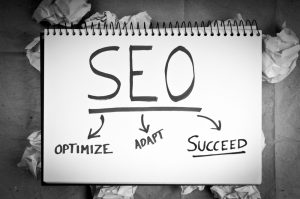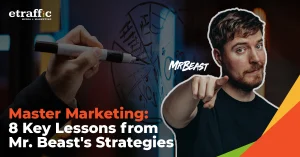![]() Posted by Cameron Francis
on
21 Sep , 2022
in
Digital Marketing
Posted by Cameron Francis
on
21 Sep , 2022
in
Digital Marketing

Entity-based SEO is a novel concept in digital marketing with a ton of promise however, there aren’t currently any solid implementations. This gives you the ideas, tactics, and resources you’ll need to improve your site’s entity support.
So the big questions are, why can certain entities be utilised to implement a long-term SEO strategy, and how can they be used to boost a website’s performance? This article will explain why entities are crucial for SEO and how they can be utilised to improve on-page SEO, simplify a site’s design, and boost traffic.
What Is Entity-Based SEO?
SEO is an abbreviation for search engine optimisation, the process of increasing the quantity and quality of visitors to your website via organic search engine results. Recent data suggest that organic search queries drive over 50% of website traffic. To improve traffic, SEO has primarily focused on keywords since the beginning.
However, instead of keywords, entity-based SEO focuses on people, places, and things. It’s simple, yet it necessitates a significant shift in mindset.
Understanding Entity-Based SEO
Entity-based SEO is something your organisation should consider. For entity searches, SEO is not a secret. There is loads of information on the internet about how this all works. While most of this is simple to comprehend, it does not negate the need for entity-based SEO. In fact, it could mean the difference between mediocre and excellent search results.
An entity is a distinct, well-defined concept. Someone or something can take on a variety of shapes and sizes. On average, Google receives around 5 billion searches in a day. Currently, search engines are doing away with the idea of considering just keywords as the entities searched, such as brands, events, books, places, domains, ideas, enterprises, and people, to enhance the user intent.

How Entity-Based Search Fits Into the Mix
Of course, keywords play a significant role in search engine optimisation. However, they can be challenging to follow. One-time or singular keywords don’t help as much as entity optimisation when it comes to getting to the top of search engine results pages. When you utilise an entity-based SEO strategy, you give your content greater weight.
With this SEO strategy, the return on investment is better. As you create your content strategy, keep the following points in mind. To begin, consider entities as themes. Then, by bringing up other connected issues, you can provide more information about such topics. For example, in the US, there are two Orange counties, one in California and another in Florida. However, you can make your content specific to Orange County, California, by linking it to the California website you’re attempting to reach.
Remember that an entity is nothing more than a collection of ideas. There are two places named Orange County, but only one exists in California. You could, for example, write about Disneyland. You might also write about Knott’s Berry Farm. These two locations are unique to Orange County, California. The way you talk about Orange County and other places in your essay indicates that you’re in California. The search engines will link your site to that place or object as long as it has unique, well-written website content.
Difference Between Keywords And Entities
There are good relationships between entities and keywords, but the two terms are very different. Here’s how they’re distinct.
Keywords
Keywords are the words or phrases that appear in search results. They are frequently the most crucial component of search queries. It might be a query, a sentence, or just a single word. For example, users who want to learn how to use cosmetics can key in terms like makeup tutorials, and so on.
Keywords are crucial because they help people find what they’re looking for. Your goal is to rank for a search term that a person can use to locate your brand to get more visitors to visit your website without paying for ads. For a long time, SEO has been based on keywords. In a month, a typical keyword will get over 900 searches.
Entities
Entities can be thought of as large topics in which keywords exist. An entity, according to Google, is a single, distinct, well-defined, and discernible thing or notion and not necessarily an actual item. An entity must link to a search engine’s knowledge graph, which displays how information and data throughout the internet are connected, to be regarded as valid. Search engines can read your page more easily with knowledge graphs.
Examples of entities are people, places, things, businesses, and even abstract concepts. They should never be confused with other objects or words. Search engines have improved their accuracy by putting more weight on things rather than keywords. However, because search engines aren’t psychic, they’ll need additional details to figure out what you’re looking for.
Traditional SEO Versus Semantic SEO & The Difference
Semantic SEO is not the same as traditional SEO. It examines real-world events that are made up of people, locations, and things (like ideas and concepts). If you search for the term “a woman who lives in a bathroom downstairs.” Google is aware of your location and provides you with relevant results. It also recognises that you misspelled Amazon and provides you with relevant results. The remaining 90% do not use BERT to decipher search queries and content.
As a result, having a content structure already set up with apparent link building between the different elements is critical for Semantic Search Engine and Semantic SEO. Structured Data is a Semantic SEO method that provides a Semantic framework to a web page, making information easier for users and search engines to grasp. Semantic SEO is a way of thinking that helps individuals comprehend how search engines work and improve their critical and analytical thinking skills by demonstrating how ideas are connected for holistic SEO.
Semantic SEO’s purpose is to create a network of regularly updated, connected material for each entity inside a subject. The merging of words, things, and facts that make sense in a given context is known as semantic SEO. Semantic SEO does not attempt to answer a single query about a subject. Instead, it seeks to answer all of the user’s search queries about the same topic and presents the essential facts in a logical order.
All of a subject’s subtopics should be utilised to scan SERPs and define user intent for the Semantic SEO project. Semantic SEO is crucial since it allows you to concentrate on a topic as a whole rather than just one keyword. SEMRush and Brado’s research suggests that at least 19% of SERPs contain Featured Snippets, ranking number one almost every time.

How To Shift Your Strategy To Entity-Based SEO
Using entities as a focus in your current SEO efforts may help you prepare for future algorithm adjustments. In the coming years, knowing whose businesses you work with and establishing yourself as a separate company will become increasingly vital. How do you make the transition from keyword-based strategies to entity-based strategies?
Include your company in the appropriate directories. Listing your company in internet directories is one approach to take advantage of entity-based SEO.
The Google Knowledge Graph, for example, uses data from Google My Business. Other listing services, such as Yelp, can also assist you in building solid and domain-rich backlinks for your business and establishing it as a recognised organisation. Yelp is among the top five results in 92 per cent of Google web searches. Because listing sites range from one location to the next, conduct your research before deciding where to list.
It would help if you also chose high domain authority sites to increase your search engine ranking. This is a means for the companies listed on this page to create entities and begin connecting keywords. Concentrate on developing your brand.
Another critical aspect of entity-based SEO is brand building. Any offline efforts you take to establish your brand’s presence should be replicated online, and you should constantly be brainstorming new ways to give your company a distinct character. Managing your reputation is becoming increasingly crucial since it has the potential to influence how an entity is established.
Keep track of the keywords for which you currently rank, and if any PR issues arise, mark them down and address them. Consider how you use your interface management software.
Interface management is becoming more crucial in entity-based SEO since a fragmented approach to collaboration could harm search engine visibility. Even if keyword rankings significantly impact some businesses, this may still occur. In the long run, focusing on keywords will no longer suffice. Businesses and marketers must focus on entity-based SEO and begin applying ways to connect their content to their entities.
How Google Uses Entities
Google uses entities because they allow it to connect all of the information on the planet, regardless of the language in which it is written. Entities assist people in comprehending the meaning of data and the areas in which its consumers are interested.
Does Google Use Entities As A Ranking Factor?
The purpose of entity SEO is for a website or brand to be linked to more specific terms and entities. There are numerous options for doing so:
- Content plays a significant in SEO. Choose the topic you’ll write about and the primary keyword you wish to rank for to improve your content even more. To perform entity analysis, use Page Optimiser Pro or the free Google NLP Tool.
- Backlinks indicate the importance and popularity of content. They’re now also used to demonstrate how different topics are related. This is true for both links and mentions, which are references to your website on other websites that aren’t related to yours. Regarding mentions, having your brand mentioned is advantageous because Google will know that you are being discussed. The goal with links is to gain connections from pages that strongly connect to your page’s topic, not just those with a high DA. People nowadays believe that a link’s relevance to your desired subject or topic is just as vital, if not more important, than the authority of the backlink’s source.
Things that haven’t been categorised yet can be designated entities using semantic data, also known as schema data or structured markup data. You can inform the search engine of the URL of a reference website by using “SameAs” in the source text. This clarifies the nature of the entities on your page. This indicates that two resources or URLs represent a single entity. People will view your site in the same way they view Wikipedia pages, which is a trustworthy source.

How Does Google Detect Entities?
According to InLinks industry reports and studies, Google detects only about 20% of the entities in a text on average. This result was obtained using only the Google NLP API. However, the findings reveal that Google’s API does not always correctly identify the main point of the articles it publishes on Google Discover. As a result, it appears that Google employs more than one method to determine what is on a page, such as;
- A natural language processing system that is similar to its API (their API can identify virtually 100 per cent of people, places, and organisations, but only a small number of ideas or things)
- Things found on other pages of the site are considered off-page factors (serving as contextual entities and allowing an additional stage of disambiguation) adding a step to the sorting process by serving as contextual entities
- On-page elements such as Schema.org markup, which describes the entities on the page in detail, are also important
Entities Help Build The Knowledge Graph
We’re talking about entities directly linked to the Google Knowledge Graph. As a result, you can use the Knowledge Graph to learn more about Google topics you’re already familiar with. To see a list of essential entities that meet particular criteria, use the Google knowledge graph/knowledge panels. If the name doesn’t appear exactly – it does not produce an entity graph. Instead, it returns entities similar to what you’re looking for.
A tutorial on utilising the Google Knowledge Graph API and the knowledge panel is available from Google. Anyone can use the API to conduct an entity search query however, a developer may be required. Look at the IDs field to better understand the Google knowledge graph. An entity ID is a computer-generated number (MID). It’s a one-of-a-kind method of identifying something and holding ideas together.
Final Thoughts
Entity-based SEO is a terrific approach to demonstrating the context and significance of your brand on the internet. Because entities focus on concepts and context rather than words or phrases, they provide a complete view of your material and may perform better than typical keyword research methods. Marketers will have more opportunities to add depth to their branding efforts by putting more work into SEO based on entities.
To get started with Entity-based SEO campaigns that work, please call us at ETRAFFIC today at 1300 887 151 or book a free strategy session below.






